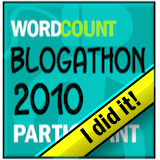I'm a big fan of saying "Thank you." So I'm delighted to feature this guest post by Suzanne Muusers of Prosperity Coaching. Suzanne is a consultant to financial advisors. I met her through Twitter.
The Lost Art of the Thank You Card
By Suzanne Muusers
 What would happen to your referrals if you wrote five thank you cards per week? Would your client relationships deepen? Would you spread goodwill and kindness?
I've been sending out a lot of hand-written thank you cards lately. I find really nicely designed thank you cards at Trader Joe's and AJ's and I just get the urge to send them. You wouldn't believe the response I get when the recipient receives the card. I usually get a phone call from them gushing about "taking the time to send a hand-written card" and "thank you so much for thinking of me."
What would happen to your referrals if you wrote five thank you cards per week? Would your client relationships deepen? Would you spread goodwill and kindness?
I've been sending out a lot of hand-written thank you cards lately. I find really nicely designed thank you cards at Trader Joe's and AJ's and I just get the urge to send them. You wouldn't believe the response I get when the recipient receives the card. I usually get a phone call from them gushing about "taking the time to send a hand-written card" and "thank you so much for thinking of me."
We have become such a digital world we forget about the impact such a simple action can have. We now have email, ezines, newsletters, evite.com, and the like. While it's nice to save paper on such niceties and be "green," getting a card in the mail is like getting a present. When you send someone a card through the mail, I am betting that it stays on their desk for quite some time.
As I glance over my desk, I see a hand-written card I received from a financial advisor I met last month at the Financial Planning Association meeting. He asked me for advice on where he should get coach training. I gave him a few choice pointers and several days later received a beautiful zen-like card from him thanking me for the tips. You can bet that I'll keep that card for a long time.
So how can you use thank you cards in your business? What occasions would be suitable for a thank you card?
How about:
- Birthday cards
- Nice to meet you cards
- Thank you for the referral cards (as part of a written referral program)
- Congratulations for your achievement
- Sympathy cards
- Wedding cards
Maybe thank you cards should be part of your Marketing Plan and part of your week!
Suzanne Muusers is a business coach, marketing expert, and a sales and marketing speaker based in Scottsdale, Arizona. Her coaching program for financial advisors, The Prosperous Advisor™ , focuses on revenue-building activities.
____________________
Susan B. Weiner, CFA
If you're struggling to pump out a steady flow of good blog posts, check out my five-week teleclass for financial advisors, "
How to Write Blog Posts People Will Read," and sign up for my
free monthly e-newsletter.
Copyright 2010 by Susan B. Weiner All rights reserved



